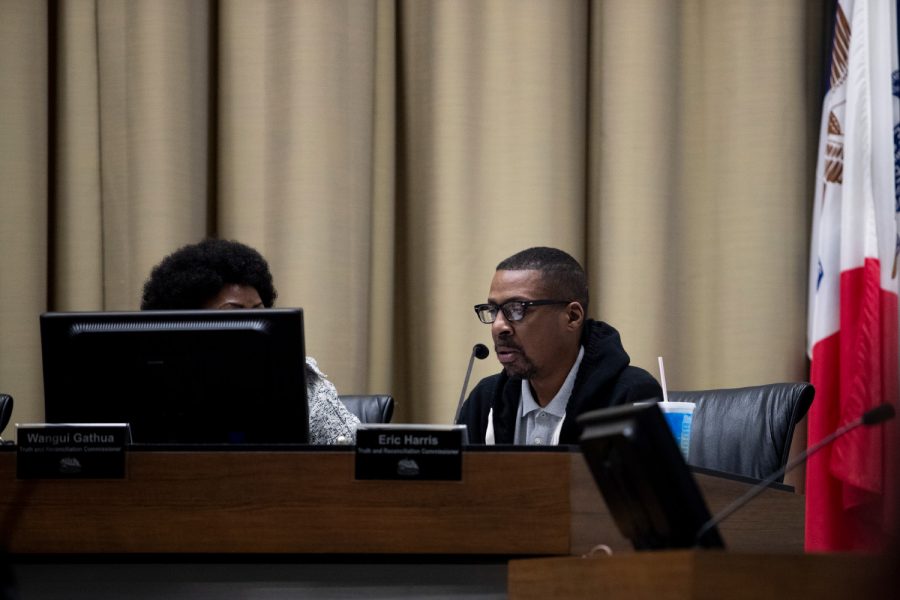In response to an appeal, the Iowa Supreme Court recommended the dismissal of three charges against former Iowa City commissioner Eric Harris after the mandated time period for a speedy indictment was missed by a day.
The three charges — child endangerment, second-degree harassment, and reckless use of a firearm — stemmed from a reported incident on March 25, 2023, in which police officers arrived at an Iowa City residence and observed Harris holding a blow torch to his face.
The criminal complaint states that officers observed evidence that Harris lit multiple pieces of furniture, in addition to himself, on fire using the blow torch.
The residence was reportedly occupied by multiple other people, including two minor children.
Harris was a member of Iowa City’s Ad Hoc Truth and Reconciliation Commission, which was created in September 2020 with the purpose of advising the Iowa City City Council on addressing issues of systemic racism.
Stefanie Bowers, Iowa City’s equity director, wrote in an email to The Daily Iowan that Harris was appointed to the TRC by the City Council on Nov. 17, 2020.
TRC members later voted unanimously in October 2023 to remove Harris from the commission, citing his multiple absences from commission meetings rather than his earlier arrest. Bowers wrote that the City Council removed Harris on Nov. 6, 2023.
Harris was later arrested on Sept. 30, 2023, for escape from custody while he was on house arrest. According to the criminal complaint, authorities discovered that Harris’ ankle monitor pinged at the Trailways bus station in Iowa City, where the monitor was later located in a trash can. Harris then proceeded to admit to officers via text that he intended to flee from charges.
The charges stemming from that incident were not appealed and not among those that the Iowa Supreme Court recommended to dismiss.
On May 15, 2023, Harris’ attorney filed a motion to dismiss the charges of child endangerment, harassment, and reckless use of a firearm in Johnson County district court. The motion to dismiss states that Harris’ trial information was not filed until 46 days after Harris’ March 25 arrest, which violates the state’s speedy indictment rule.
The first motion to dismiss was denied, at which point Harris applied for discretionary review, which was granted. The case was then transferred to the Appellate Defender’s Office, and Josh Irwin, assistant appellate defender, was appointed to represent Harris.
Irwin explained that Harris’ case unfolded amid an amendment to Iowa’s speedy indictment rule. Under the old speedy indictment rule, the state was mandated to file trial information within 45 days of the defendant’s arrest.
The new rule, citing precedence from the 2017 case of State v. Williams, added a sentence stating that the 45-day window begins after the defendant’s initial court appearance, which typically happens the day after an arrest.
Harris’s trial information was posted 45 days after his first appearance but 46 days after his arrest.
“In Mr. Harris’s case, that new sentence didn’t apply,” Irwin said. “So basically, it was pretty clear under the law that the time clock started ticking the moment he was arrested.”
In an email statement to the DI, Johnson County Attorney Rachel Zimmerman Smith acknowledged that Harris’s case fell under the old rule.
“We respect the court’s ruling under the law as it was in March of 2023 when the arrest occurred,” Zimmerman Smith wrote. “The new rule on speedy indictment that went into effect July 1, 2023 (two months after the arrest in this case) brings needed clarity to this issue.”
Irwin said Harris’s arrest occurred just before midnight, meaning that the 45-day window was likely missed by mere minutes. Nevertheless, the time clock started on March 25.
“The speedy indictment rule is one of these hard-line rules that are important for criminal defendants in particular,” Irwin said, adding that a looming prosecution interferes with a defendant’s wellbeing and the right to a speedy trial must be set in stone.
Irwin explained that the next step in Harris’ case is for the Supreme Court to issue a procedendo order, which will transfer Harris’ case back to trial court for dismissal.
“The Supreme Court doesn’t actually have authority to dismiss a case itself,” Irwin said. “District courts have that power, and the Supreme Court has the power to tell district courts what to do.”
Irwin said that order is eligible to be filed 14 days after the Supreme Court issued its opinion, but the procedendo order has not been filed yet.



